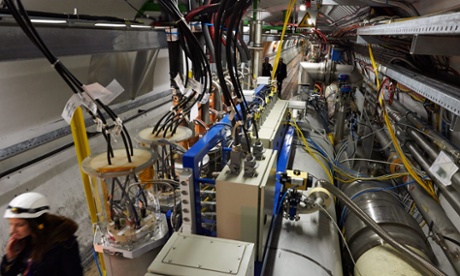The race to discover an elusive subatomic particle that was predicted by researchers with pen and paper nearly half a century ago enters the final straight this week at the home of the world's largest scientific instrument.
Workers at Cern, the European particle physics laboratory near Geneva, will begin smashing particles together inside the £6bn Large Hadron Collider (LHC) within days, following a 10-week winter shutdown for basic maintenance.
These minuscule acts of violence mark the beginning of what many physicists hope will be a new era of discovery in which the Higgs boson – a strange particle whose existence was proposed in 1964 and is thought to give mass to the constituents of matter – is finally ensnared.
The vast machine, which occupies a ring-shaped tunnel more than 8km (5 miles) across, may see signs of Higgs particles this year and confirm their existence in summer 2012 or soon after. "We will know a lot more about the Higgs by the end of the year," said Bill Murray, a Cern physicist who works on the machine's giant Atlas detector. "We might see hints this year."
Cern managers had planned to shut the LHC for more than a year from 2012 to bolster safety systems before running the machine at full power. But the collider has performed so well, those repairs have been pushed back to 2013, giving researchers a real chance of major discoveries before the temporary closure. The collider was restricted to half energy after a short-circuit blew a hole in it in 2008.
Steve Myers, Cern's director of accelerators and technology, said the LHC will run at a maximum energy of 7TeV (tera- or trillion electronvolts) this year, but may move to a higher energy next year, once the lab has done a full risk assessment. "We have to be conservative. The impact of something going wrong could be a year shutdown and a complete loss of our reputation," he said.
The LHC has already churned out results that challenge scientists' thinking. Most recently, it ruled out the existence of some lightweight particles described by one version of "supersymmetry", a theory that postulates a heavy twin for every known variety of particle in the universe. Scientists at the lab are writing so many papers that Sergio Bertolucci, the lab's director of research, said approving them alone had become a full-time job.
Inside the LHC, two beams of hydrogen nuclei are accelerated to almost the speed of light in opposite directions around a 27km vacuum pipe. At four points around the ring, powerful magnets steer the beams into head-on collisions, producing spectacular showers of subatomic debris that are recorded by detectors. New particles pop into existence as a result of these impacts, in an elegant demonstration of Einstein's famous equation of mass and energy.
The Higgs may be the LHC's most publicised goal, but more exotic discoveries are hoped for. Cern researchers will sift through the debris of countless collisions for signs of supersymmetric particles; dark matter, which makes up a quarter of the mass of the observable universe; extra dimensions of space; and even fleeting, microscopic black holes that evaporate into nothing.
"The next two years will be the years of discovery, and they will be extremely important for planning the future of physics," Bertolucci told the Guardian. "People are excited. And they are working like crazy."
The LHC is not the first machine to hunt the Higgs particle. The collider's predecessor at Cern spent much of the 1990s looking, but closed to make way for the LHC just as some researchers thought they had glimpsed it. Another collider, the Tevatron at Fermilab in Illinois, is also pursuing the particle, but is scheduled to close at the end of the year.
The Higgs boson is hard to find because its mass, and so the energy needed to make it, is unknown. To make matters worse, it is highly unstable and quickly decays in a puff of more familiar particles that obscure its presence.
"We know that we will either discover the Higgs particle or rule it out, and in either case, it will be a big result," Bertolucci said. "Of course, it's more difficult to sell as a big result if we don't find it, but if the Higgs doesn't exist, there must be something else in its place."
The Higgs is the only missing piece of the reigning theory of physics, the Standard Model, which describes all the known particles and forces except gravity. To some physicists, discovering the single Higgs particle predicted by the Standard Model would be little short of a disaster, however, because it would give no clues as to where the next breakthrough might come from. One version of supersymmetry, for example, calls for five Higgs particles, all with different masses.
Previous experiments suggest the simplest Higgs particle has a mass somewhere between 114 and 185GeV, where one GeV is roughly equivalent to the mass of a proton, a subatomic particle found in all atomic nuclei. The Tevatron has ruled out the existence of a Higgs particle with a mass between 158 and 175 GeV, and will broaden its search through the year.
Engineers and technicians have drawn up a list of tweaks that should squeeze more collisions out of the LHC, and so boost the chances of scientists finding something new to physics this year. So far, the machine is working far better than expected, though managers know from experience that catastrophe can strike out of the blue. "In this business you have to be very optimistic in your heart, and almost paranoid in your brain," said Bertolucci.










